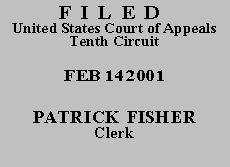

| ROBERT GARY,
Plaintiff-Appellant, v. U.S. WEST COMMUNICATIONS, INC., Defendant-Appellee. |
|
Plaintiff/appellant Robert Gary appeals from summary judgment granted in favor of defendant/appellee U.S. West Communications, Inc. on his claims brought pursuant to sections 1132 and 1140 of the Employee Retirement Income Security Act of 1974 (ERISA), 29 U.S.C. §§ 1001-1461, federal common law, and state law. Our jurisdiction arises under 28 U.S.C. § 1291, and we affirm.
The relevant facts are set forth in the district court's thorough and well-reasoned order of November 24, 1999. On appeal, Mr. Gary argues that the district court erred in holding that: (1) his claim for benefits should be dismissed for failure to exhaust administrative remedies; (2) his evidence was insufficient to support his claim for retaliation; and (3) dismissal of his case should be with prejudice. "We review a district court's grant of summary judgment de novo, applying the same legal standard used by the district court pursuant to Federal Rule of Civil Procedure 56(c)." Deboard v. Sunshine Mining & Ref. Co., 208 F.3d 1228, 1237 (10th Cir. 2000). After reviewing the parties' briefs and conducting a de novo review of the record, this court concludes that the district court correctly decided issues one and two for substantially the same reasons as stated in the district court's order. See Appellant's App. Vol. IV, at 1040-50. As U.S. West Communications points out, Mr. Gary did not appeal from the district court's determination that, notwithstanding Mr. Gary's failure to administratively appeal from the denial of benefits, U.S. West Communications did not abuse its discretion in denying his disability claim. Thus, dismissal of the case with prejudice was also proper.
The judgment of the United States District Court for the District of Colorado is AFFIRMED.
Entered for the Court
Circuit Judge
*. This order and judgment is not binding precedent, except under the doctrines of law of the case, res judicata, and collateral estoppel. The court generally disfavors the citation of orders and judgments; nevertheless, an order and judgment may be cited under the terms and conditions of 10th Cir. R. 36.3.